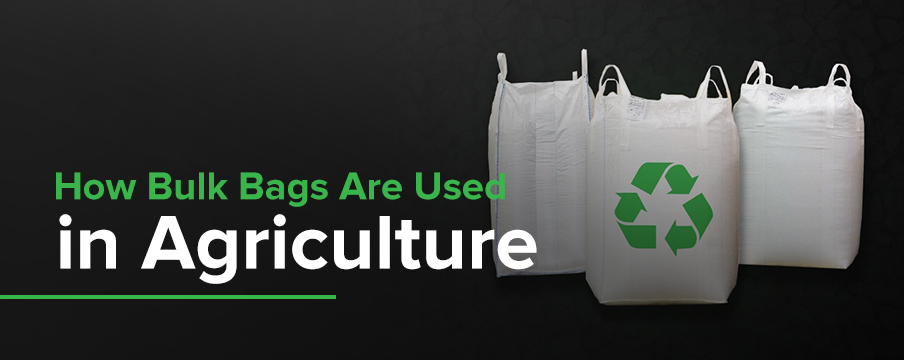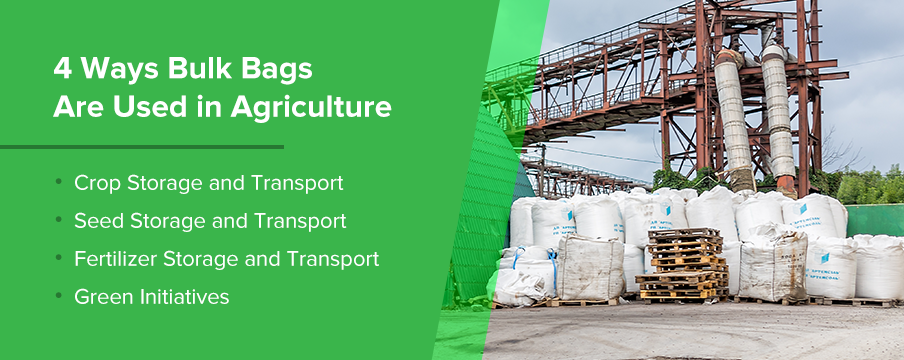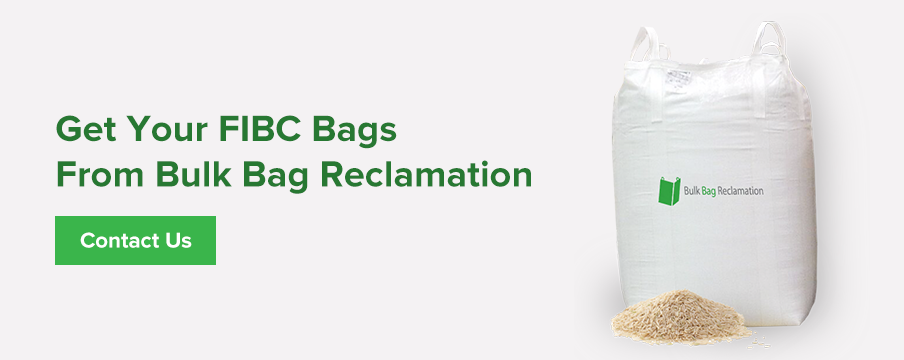How Bulk Bags Are Used in Agriculture
Agriculture is a broad industry. During the growing seasons, farmers need to harvest products, spread seed, fertilize their crops, store materials and transport their yield to buyers. It’s a lot to take care of, and a large amount of product to move around. Bulk bags help farmers collect, organize, ship and distribute their materials and crops, including everything from vegetables and grains to fertilizers.
This guide will show you how bulk bags are used in agriculture, the benefits they provide and where to buy them.
Pros of Using Bulk Bags for Agricultural Purposes
Bulk bags can be a valuable tool for farmers and those in the agricultural industry. They’re excellent for collecting, storing, organizing, shipping and selling products and materials. With the right varieties of bags, farmers can streamline their processes, save more of their yield and help conservation efforts.
Some of the other pros of bulk bags include:
- They’re reusable, repairable and recyclable.
- They come in many shapes and sizes for various purposes.
- They’re customizable to individual needs.
- They’re compatible with farm equipment.
- They help reduce the costs of container purchases.
- They increase profits by protecting and preserving products.
- They help prevent contamination, pests, water damage, travel damage and other threats.
4 Ways Bulk Bags Are Used in Agriculture
Bulk bags are beneficial when it comes to storing and hauling agricultural materials. Farmers can use them to accomplish many of their daily tasks and activities at a more efficient pace, and their size, shape, configuration, versatility and durability are all beneficial to the industry. The bags also lend themselves to the entire journey of agricultural products, from their storage to transport to use, and can be recycled afterward, creating an environmentally-friendly and sustainable cycle.
Some of the leading agricultural bulk bag uses include:
1. Crop Storage and Transport
Once a farmer fills bulk bags with crops, they can remain in the same containers for storage purposes, during shipping and even for sales. They keep the products safe from potential damage and allow farmers to organize them neatly and make the most of their storage space.
When it comes to crops, transportation is a major concern. They need to be able to make it from the storage area to their end destination without sustaining damage. If the crops are affected in any way during the shipment process, they become useless to the buyer and the farmer loses money. Vegetables and fruits are fragile and require adequate protection to keep from being crushed or bruised. Smaller crops like wheat, barley and nuts need to stay dry and cool throughout the travel process.
Bulk bags help to keep all crops safe and secure throughout their journey, as well as provide an easy way to move them with minimal handling. This protection means a more profitable yield for farmers and more usable materials for buyers and retailers.
2. Seed Storage and Transport
To even begin new crops or feed livestock, farmers need to be able to stock, ship and collect large amounts of seed. While seed is less likely to sustain major damage during movement, it still needs plenty of protection. Moisture and heat can spoil it, rendering it useless in many cases. Additionally, small animals like birds and rodents can get into the seed and either eat it or cause it to spill out of lower quality bags.
Any product lost can cost farmers money and potentially put them in a tight spot with buyers or in their daily processes. The right bulk containers can protect seeds from water damage, help keep them cool, serve as organized storage and shipping vessels and even extend the longevity of the product. Bulk bags can help keep seeds usable for over a year, depending on the variety.
3. Fertilizer Storage and Transport
Beyond their product, farmers need to keep other materials in storage for extended periods, such as fertilizer. Fertilizer is crucial to agricultural success, as crops won’t grow without it. It helps farmers produce a higher crop yield, so they need to have a secure method of stocking and distributing it for the sake of their business. Fertilizers can be either organic or inorganic, and come in liquid, semi-liquid or dry forms.
Bulk bags help preserve fertilizer and make loading, unloading and distribution easy. They have convenient handles that simplify moving them from location to location and are big enough to store significant amounts. Since fertilizer can become contaminated as well as contaminate other materials, it’s essential to pay attention to ecological concerns. Bulk bags keep the product safe and contained.
4. Green Initiatives
For those involved in the agricultural industry, it’s essential to consider how various processes and products affect the environment. Energy conservation and preservation of natural resources are always at the forefront of agricultural concerns. Bulk bags help to replace paper bags and cardboard boxes in storage, transportation and distribution efforts and are reusable, making them a green option.
They’re also versatile, meaning farmers can use them for many different applications and continue to recycle them throughout each season. Bulk bags are large and durable, meaning farmers are likely to use far fewer of them throughout a year than they would use paper products. Every farm that adopts bulk bags into their daily routines has an impact on the planet.
Why FIBC Bags Are Useful for the Agricultural Industry
Flexible intermediate bulk container (FIBC) bags are essential in agricultural processes. From storage to the transport of many different materials, the agricultural applications of FIBC bags are varied. But their benefits remain the same across all uses. Bulk bags provide farmers with:
- High quality: For farmers that harvest, package and supply food items, such as fruits and vegetables, bag quality is a significant consideration. There are certifications suppliers must have to be able to verify that their containers are safe for food-grade products. FIBCs can be proven safe for such items and provide ample protection from other materials and transport damage.
- Easy availability: When farmers need containers quickly, they can rely on reliable FIBC bag suppliers to meet their demand. They keep large stocks of bags in their supply centers for such emergency needs. You can also place orders for specific varieties or customized containers a few months in advance.
- Various sizes and styles: Since farmers deal with many different types of crops and materials, they’ll often need multiple kinds of bags to suit their needs. There are varieties made for the specific crops, seeds or fertilizers they plan to store and transport. For example, some forms of produce need aeration, whereas other materials require bags with liners. FIBC bags make it easier to provide the specific care each product requires.
FIBC bags are the best, most reliable choice for farmers and their daily processes. There are many varied needs when it comes to the agriculture industry, and FIBC bags can handle them all.
Get Your FIBC Bags From Bulk Bag Reclamation
If you require bulk bags for your agricultural processes, partner with Bulk Bag Reclamation. We provide high-quality containers for a variety of uses, and our team will recondition and repair your bags to increase their longevity. If you need new FIBCs, we can provide you with them and recycle your old bags. At Bulk Bag Reclamation, we’ll fulfill your needs while helping to do our part for conservation efforts.
For more information about what we offer, contact us or submit a quote request.



